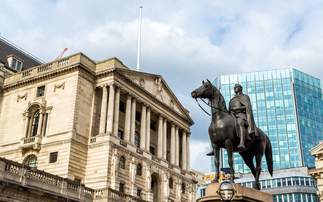The Ruffer investment trust's protective assets have "earned their keep" so far this year, countering losses from its position in Japanese equities, the managers have said.
A dismal start to the year for Japanese equities has hurt investors including Ruffer which had previously labelled the region the "most interesting place" to get equity risk.
The fund's NAV fell 1.5% in January, but the duo managed to outstrip the 3.1% fall in the FTSE All-Share, thanks to a number of counter-plays including investments in gold and index-linked bonds.
"The protective assets have largely done their job and those investments which were holding us back last year earned their keep," managers Hamish Baillie and Steve Russell said in the latest update.
The managers said they have added more long-dated TIPS (US index-linked bonds) in January and "tentatively dipped a foot" into gold miners as they maintain the protection theme in the wake of the EM-induceed sell-off.
Japanese equities - and other markets - have fallen due to the reliance on emerging market growth, they said, while the "dash to the yen" had strengthened the currency and consequently increased the cost of Japanese exports, further hurting stocks.
"Our equities did not escape these falls and indeed Japanese equities suffered from the dash to the safety of the yen as a bolt-hole currency, and a stronger currency hurts Japanese exports," they said.
As a result the duo have also slashed their exposure to Japanese equities, taking the £332m trust’s exposure to 15%, compared to 17% in January and 22% in the middle of 2013. Exposure to the yen is at 7%.
With protection at the forefront of their minds, Baillie and Russell said by the end of January, US Treasury index-linked bonds accounted for the top five holdings in the trust, while gold bullion securities represented 2.7%.
Just 2.3% of the trust was in the Ruffer Japanese Fund, following a stark turnaround in sentiment from the managers.
In January, Baillie and Russell had argued Japan offered “the most interesting place” for equity risk. Praising Abenomics, they said the country was no more vulnerable to global shocks than other markets.












